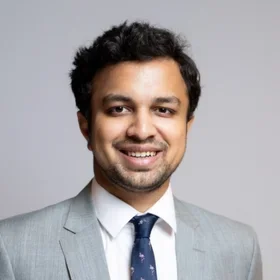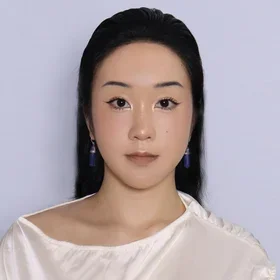Current Position: Strategy & Transformation Manager, EY
SPS Program: ’23SPS, M.S. in Technology Management | Full-Time, On Campus
Before enrolling at Columbia, Subbu Muthukrishnan had considerable experience in software engineering, cloud computing, and solution architecture. In 2020, when his employer merged with another company, Muthukrishnan decided it would be a good time to elevate his executive and leadership skills—and expand his professional network. Thus, a year-long sabbatical to earn Columbia’s M.S. in Technology Management.
“Overall, the program was an excellent investment that allowed me to grow professionally and made me more confident in my abilities as a technology leader in business,” he said. Some of the highlights: reframing his thinking in the context of driving business outcomes; access to Columbia Business School’s startup lab and Columbia Engineering’s Startup Bootcamp; and pushing beyond his comfort zone as an introvert by meeting new people every day in the financial capital of the world.
Just a month after earning his master’s, Muthukrishnan accepted a strategy and transformation manager role at EY, where he helps clients to achieve their sustainability and ESG goals through cloud adoption and data management strategies. In a recent interview with Shana Childs (’14JRN), he reflected on his personal and professional growth while at Columbia in New York City.
What attracted you to the M.S. in Technology Management program? Why Columbia?
The Technology Management program attracted me for three broad reasons.
First, it’s really a business program for technology leaders. Overall, the “Tech-M” program, as we call it, was the perfect fit for me as an experienced engineer in the technology industry looking to expand my business knowledge and skills. That the program’s courses are handpicked by technology leaders and offered by Columbia was a key attractive factor. The opportunity to learn from industry experts and network with other technology leaders was another important factor in my decision to pursue this program.
The curriculum is also concise and comprehensive. The full-time, 12-month format was an excellent fit because it allowed me to continue working in the industry without taking a prolonged break. The program’s course structure was also a significant factor in my decision; there is a clear progression from basic concepts in the first semester, to advanced concepts in the second semester, which then culminates in a capstone business idea defense in the summer. This structure allowed me to learn and apply the material logically and efficiently while also providing the opportunity to put my knowledge into practice through the capstone project.
Finally, real-world learning experiences are important to me. I was skeptical about the shift in the learning paradigm from traditional, theory-based teaching to a mix of in-person and online learning that heavily relies on PDFs of case studies, first-person accounts, and other readings and online assignment submissions. However, the curriculum assessments were well-designed and helped me to adjust to this new learning environment.
The full-time, 12-month format was an excellent fit because it allowed me to continue working in the industry without taking a prolonged break."
How has the Technology Management program impacted your approach to work?
The Tech-M program has significantly impacted my mindset and helped me to think like a leader. It helped me to take a step back and ask the right questions at the right time to the right people to understand the big picture. For example, before the program, if someone had asked me how I would build the next generation of social media, I would have started thinking about “how” and “doing” with my undergraduate engineering mindset. Now, after the program, I would start thinking about “why, what, and for whom” are we building this product?
My manager in my previous role even noticed a significant transformation; they affirmed that every penny spent on this program was worth it! It is a great feeling to know that my manager could see the positive change in me and my ability to represent myself as a technology leader in the business arena.
What were your favorite parts of your time at Columbia?
When I think about my graduate journey at Columbia, three things come to mind:
The energy of New York City pushed me to come out of my comfort zone as an introvert. Networking was one of my focus areas as a graduate student at Columbia. I made an Excel sheet to track my networking progress, committing to meeting at least one new person every day outside of classmates. As a result, I was able to find mentors, make lifelong friendships, and create memories.
The professors were obviously important, too. The Tech-M program has handpicked industry practitioners and leaders to teach our courses—the real-world lessons from them were worth every penny. In addition, the opportunity to discuss current events as they impact the field provides a deeper understanding of the industry and the challenges it faces; we talked about the cyber risks of the Russia-Ukraine war, the U.K. economic crisis, and ongoing mergers, lawsuits, or bankruptcies like FTX.
Then there was the capstone project. The opportunity to dedicate time to work on my business idea, receive feedback from investors and entrepreneurs, and validate it in the market was crucial for turning an idea into a successful startup. In addition, the added resources of the Columbia Business School’s startup lab and Columbia Engineering’s Startup Bootcamp provided additional support and guidance to bring my startup to launch.
How did your fellow students add to your experience?
Columbia’s diverse and inclusive classroom experience was one of the most valuable takeaways from my time there. Learning and interacting with diverse students from all over the world enriched my understanding of different cultures, beliefs, and perspectives. My classmates’ diverse backgrounds also provided daily learning opportunities. I didn’t just treat my fellow classmates as peers, but as valuable people within my professional network; in the process, I’ve made lifelong friendships.
Have any of your professors made a significant impact on you?
It isn’t easy to name a few, because every professor I met significantly impacted my life. What I learned from Capstone Professor Thomas Cowan is to be accountable for my time and work commitments and not to make excuses. A major memory was his speech on the final defense day of the capstone class, where he emphasized the importance of understanding the job market as a competitive game that requires each person to understand their position. Leaders, he said, define “what, when, and why”; managers describe the “how.” Knowing the difference between those two roles, for example, can determine your long-term success in the market.
Another who made an impression was Corporate Finance Professor Conrad Fernandes. There’s a famous saying that one can’t satisfy everyone in the room. It’s so untrue about Professor Fernandes. He is so talented that everyone in our class loved him and his teaching. I asked him how he was able to get this feedback consistently year after year. His reply significantly impacted me: Look after your peers, challenge yourself to provide the best on every occasion, and tailor your message for your audience.
In addition, Professor Julia Brickell’s knowledge of technology and law, Professor Deirdre Silberstein’s level of attention to detail in mentoring students, Professor Norman Jacknis’s knowledge of the data analytics industry, Professor Craig Cuyar’s real-world experiences, and Professor Doug Scherer’s plethora of knowledge significantly impacted me as well on my journey.
Tell us about your new job.
As a technology manager at EY, I advise customers on digital strategy, provide technical leadership and oversight to delivery teams, and work with engagement leads to assist with requests for proposal responses. Additionally, I design, develop, and implement data collection, transformation, and integration solutions to create, coordinate, and deploy data and analytics workloads.
The Columbia University Master of Science and Executive Master of Science in Technology Management programs provide students with technical, strategic, political, and communications skills to lead teams through constant digital innovation. Students gain the knowledge and insight to provide value to an organization by anticipating the impact of technology on individuals, organizations, and industries. Graduates leverage technology for business process improvement and successfully lead initiatives and major projects within or between organizations.
The priority application deadline for fall 2023 enrollment is February 15, and the final deadline is June 15. Learn more.


